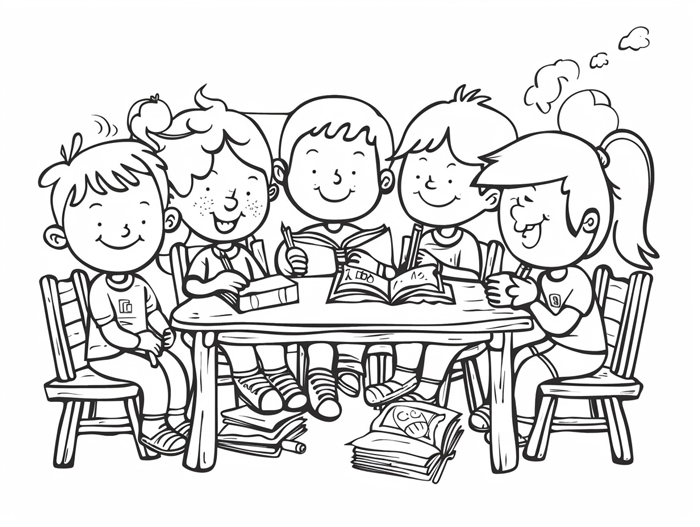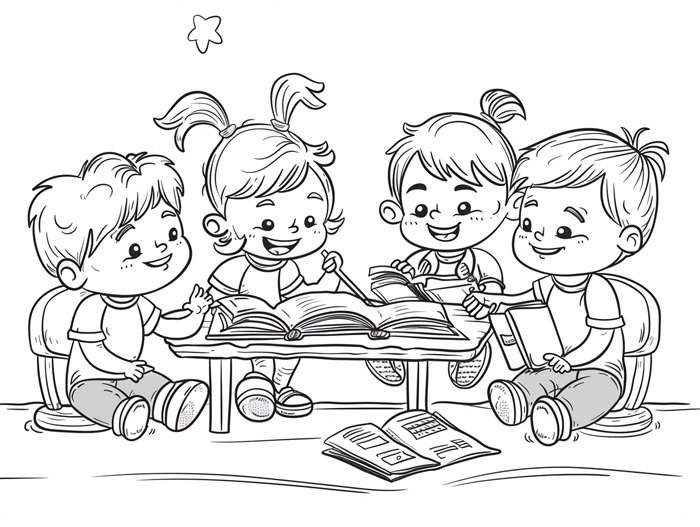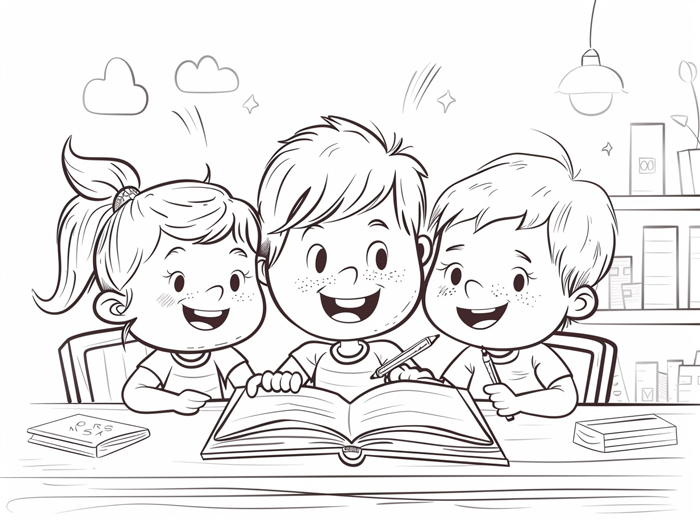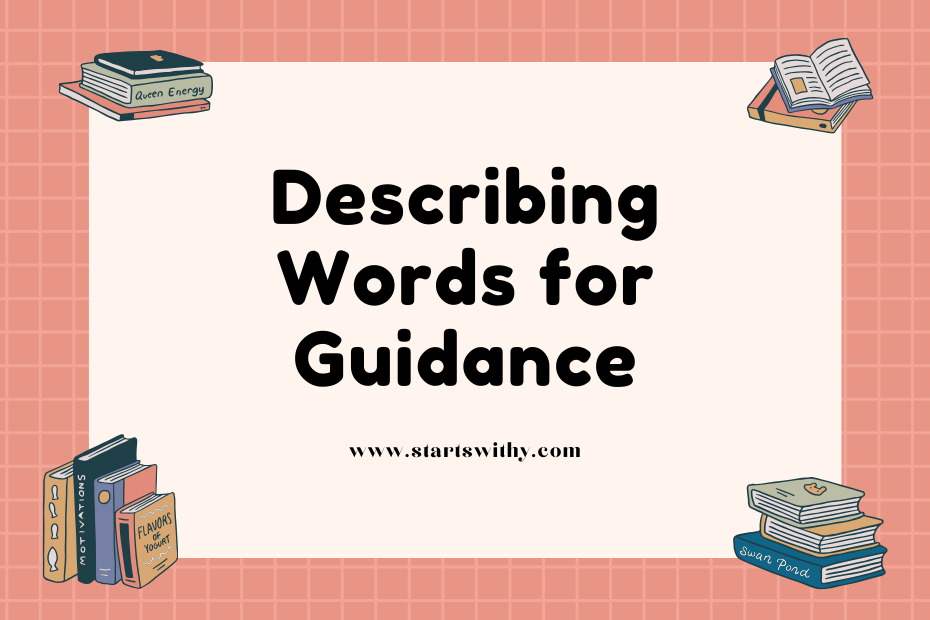Are you looking for the perfect words to describe guidance? Well, look no further! In this article, I’ll be sharing a comprehensive list of descriptive adjectives that perfectly capture the essence of guidance. Whether you’re writing a heartfelt thank-you note to a mentor or crafting an inspiring speech about leadership, these words will help you paint a vivid picture and convey your message with precision.
Guidance is a powerful force that can shape our lives and lead us towards success. It’s important to choose the right words to express the impact it has on us. From words that evoke a sense of trust and support to those that highlight the transformative nature of guidance, this article will provide you with a wide range of adjectives to choose from. So, let’s dive in and explore the world of descriptive words that beautifully capture the essence of guidance.
How to Describe guidance? – Different Scenarios

In various scenarios, it is essential to find the right words to describe guidance effectively. Here are some examples of descriptive adjectives that can be used to convey the impact and transformative nature of guidance:
- Supportive – Guidance that provides the necessary support and encouragement to help individuals reach their goals.
Example: A teacher who offers supportive guidance to a student struggling with a difficult subject can make a significant difference in their academic success.
- Empowering – Guidance that helps individuals realize their full potential and gain confidence in their abilities.
Example: A mentor who provides empowering guidance to an aspiring entrepreneur can inspire them to take risks and pursue their dreams.
- Inspirational – Guidance that ignites a spark and motivates individuals to strive for greatness.
Example: A coach who offers inspirational guidance to an athlete can push them to surpass their limits and achieve remarkable feats.
- Clear – Guidance that is concise, easy to understand, and eliminates any confusion.
Example: A supervisor who provides clear guidance on a new project ensures that team members have a clear understanding of their roles and responsibilities.
- Adaptive – Guidance that can be adjusted according to the specific needs and circumstances of individuals.
Example: A therapist who offers adaptive guidance tailors their approach to meet the unique needs and challenges of each client.
- Compassionate – Guidance that is delivered with empathy, understanding, and kindness.
Example: A counselor who provides compassionate guidance to someone experiencing a difficult life event can provide them with much-needed emotional support.
- Inclusive – Guidance that promotes inclusivity, diversity, and equality.
Example: A teacher who offers inclusive guidance creates an environment where all students feel valued and included.
Remember, the choice of words to describe guidance will depend on the specific situation and the desired outcome.
Describing Words for guidance in English

When it comes to guidance, finding the right words to describe its impact and qualities is essential. Different situations call for different descriptors, and using the appropriate adjectives can help convey the transformative nature of guidance. In this section, I’ll provide you with a variety of describing words that can be used to portray guidance in English. Let’s explore some examples below:
Supportive:
- Caring
- Encouraging
- Nurturing
- Reassuring
Empowering:
- Inspiring
- Motivating
- Strengthening
- Liberating
Clear:
- Concise
- Transparent
- Understandable
- Unambiguous
Adaptive:
- Flexible
- Responsive
- Versatile
- Adjustable
Compassionate:
- Kind-hearted
- Sympathetic
- Understanding
- Patient
Inclusive:
- Accepting
- Welcoming
- Incorporating
- Diverse
These words highlight the various aspects of guidance and its importance in different contexts. Whether you’re seeking guidance in personal growth, education, or professional development, these adjectives can help paint a vivid picture of the qualities you value in guidance. Remember, the right words depend on the specific situation and desired outcome.
To make it easier for you to understand and reference these adjectives, let’s group them into categories:
| Category | Describing Words |
|---|---|
| Supportive | Caring, Encouraging, Nurturing, Reassuring |
| Empowering | Inspiring, Motivating, Strengthening, Liberating |
| Clear | Concise, Transparent, Understandable, Unambiguous |
| Adaptive | Flexible, Responsive, Versatile, Adjustable |
| Compassionate | Kind-hearted, Sympathetic, Understanding, Patient |
| Inclusive | Accepting, Welcoming, Incorporating, Diverse |
Using these descriptive adjectives, you can effectively communicate the impact and qualities of guidance in different scenarios. Whether you’re teaching young learners or discussing guidance in a professional setting, these words will help you convey the significance of guidance in a clear and engaging manner.
Remember, choosing the right words is crucial for creating a lasting impression and ensuring effective communication. By incorporating these adjectives into your vocabulary, you’ll be better equipped to articulate the impact of guidance and its transformative power.
Adjectives for guidance

Positive Adjectives for guidance with 12 Example Sentences
When it comes to describing guidance, there are various positive adjectives that can effectively communicate its impact and qualities. Here are twelve examples:
- Supportive: I provide support to guide you through challenging times.
- Empowering: My guidance empowers you to make confident decisions.
- Clear: I offer clear instructions to ensure you understand the path ahead.
- Adaptive: I adapt my guidance to your individual needs and circumstances.
- Compassionate: I offer compassionate guidance to help you navigate difficult emotions.
- Inclusive: My guidance takes into account your unique experiences and perspectives.
- Motivating: I provide motivating guidance to help you achieve your goals.
- Encouraging: I give encouraging words to inspire you along your journey.
- Inspiring: My guidance inspires you to dream big and reach for the stars.
- Knowledgeable: I provide guidance based on my extensive knowledge and experience.
- Patient: I offer patient guidance to ensure you have the time and space to learn and grow.
- Trustworthy: You can trust my guidance to lead you in the right direction.
Negative Adjectives for guidance with 5 example sentences
While guidance is often seen as positive, it’s important to acknowledge that there can also be negative qualities associated with it. Here are five examples:
- Inconsistent: My guidance might be inconsistent, leaving you uncertain about the next steps.
- Confusing: My guidance may be confusing, making it difficult for you to understand what to do.
- Restrictive: My guidance might be too restrictive, limiting your ability to explore other options.
- Overbearing: I may provide overbearing guidance, overpowering your own voice and desires.
- Misleading: My guidance may sometimes be misleading, leading you down the wrong path.
When describing guidance, it’s crucial to choose words that accurately reflect its qualities and impact. Positive adjectives highlight the supportive, empowering, clear, adaptive, compassionate, inclusive, motivating, encouraging, inspiring, knowledgeable, patient, and trustworthy aspects of guidance. However, it’s also important to acknowledge that there can be negative aspects associated with guidance, such as inconsistency, confusion, restrictiveness, overbearingness, and misdirection. By understanding these adjectives, you can effectively communicate the nuances of guidance and create a more fulfilling and impactful experience.
Synonyms and Antonyms with Example Sentences

Synonyms for guidance
When it comes to describing guidance, there are a variety of synonyms that can help us paint a clearer picture of its qualities and impact. Below are some synonyms that can be used to enhance our understanding of guidance:
- Mentoring: Mentorship involves providing guidance and support to someone based on one’s knowledge and experience. For example, a teacher may mentor a student to help them navigate their academic journey.
- Counseling: Counseling refers to the professional guidance provided by trained individuals to help others overcome personal challenges, make decisions, and achieve personal growth. For instance, a counselor may provide guidance to individuals dealing with mental health issues.
- Direction: Direction implies the act of showing or indicating the way forward. It involves providing guidance and instruction to help someone navigate a particular situation or achieve a desired outcome. For instance, a tour guide provides direction to tourists in a new city.
- Leadership: Leadership involves guiding and motivating a group towards a common goal or vision. A good leader provides guidance to their team members, helping them achieve success. For example, a supervisor may provide leadership and guidance to their employees.
- Coaching: Coaching entails providing guidance and support to individuals or teams to help them improve performance, develop skills, and achieve goals. For instance, a sports coach provides guidance to athletes to enhance their skills and performance.
Antonyms for guidance
Just as there are synonyms for guidance, there are also antonyms that describe the absence or opposite qualities of guidance. Here are a few antonyms that can help us understand the negative aspects associated with the lack of guidance:
- Misdirection: Misdirection refers to providing misleading or incorrect guidance, leading someone down the wrong path. For example, if a teacher provides misdirection during a lesson, the students may become confused.
- Neglect: Neglect involves the lack of guidance or attention, resulting in a failure to guide or advise appropriately. For instance, a neglected child may lack proper guidance and support from their caregivers.
- Inconsistency: Inconsistency refers to the lack of stability or reliability in providing guidance. This can lead to confusion and uncertainty for those seeking guidance. For example, if a mentor is inconsistent in their advice, it may be difficult for the mentee to make informed decisions.
- Indifference: Indifference implies a lack of interest or concern in providing guidance. When someone is indifferent, they may not offer the necessary support or direction to those in need. For instance, an indifferent teacher may not provide guidance or assistance to struggling students.
Remember, the choice of words is crucial when describing guidance. Selecting the right synonyms or antonyms can help us effectively communicate the qualities and impact of guidance, whether positive or negative.
Conclusion
Describing guidance accurately is crucial for effective communication and understanding. Throughout this article, we have explored a range of adjectives that can be used to describe guidance, both positively and negatively. By carefully selecting the right words, we can paint a vivid picture of the qualities and impact of guidance.
Synonyms such as mentoring, counseling, direction, leadership, and coaching provide us with a deeper understanding of the various facets of guidance. These words help us appreciate the diverse ways in which guidance can be provided and the positive influence it can have on our lives.
On the other hand, antonyms like misdirection, neglect, inconsistency, and indifference shed light on the negative aspects associated with the absence or lack of guidance. These words serve as a reminder of the potential consequences of not having proper guidance in our lives.
The words we choose to describe guidance play a crucial role in conveying its essence and impact. By using adjectives that accurately reflect its qualities, we can create a more fulfilling and impactful experience for both the giver and receiver of guidance.



